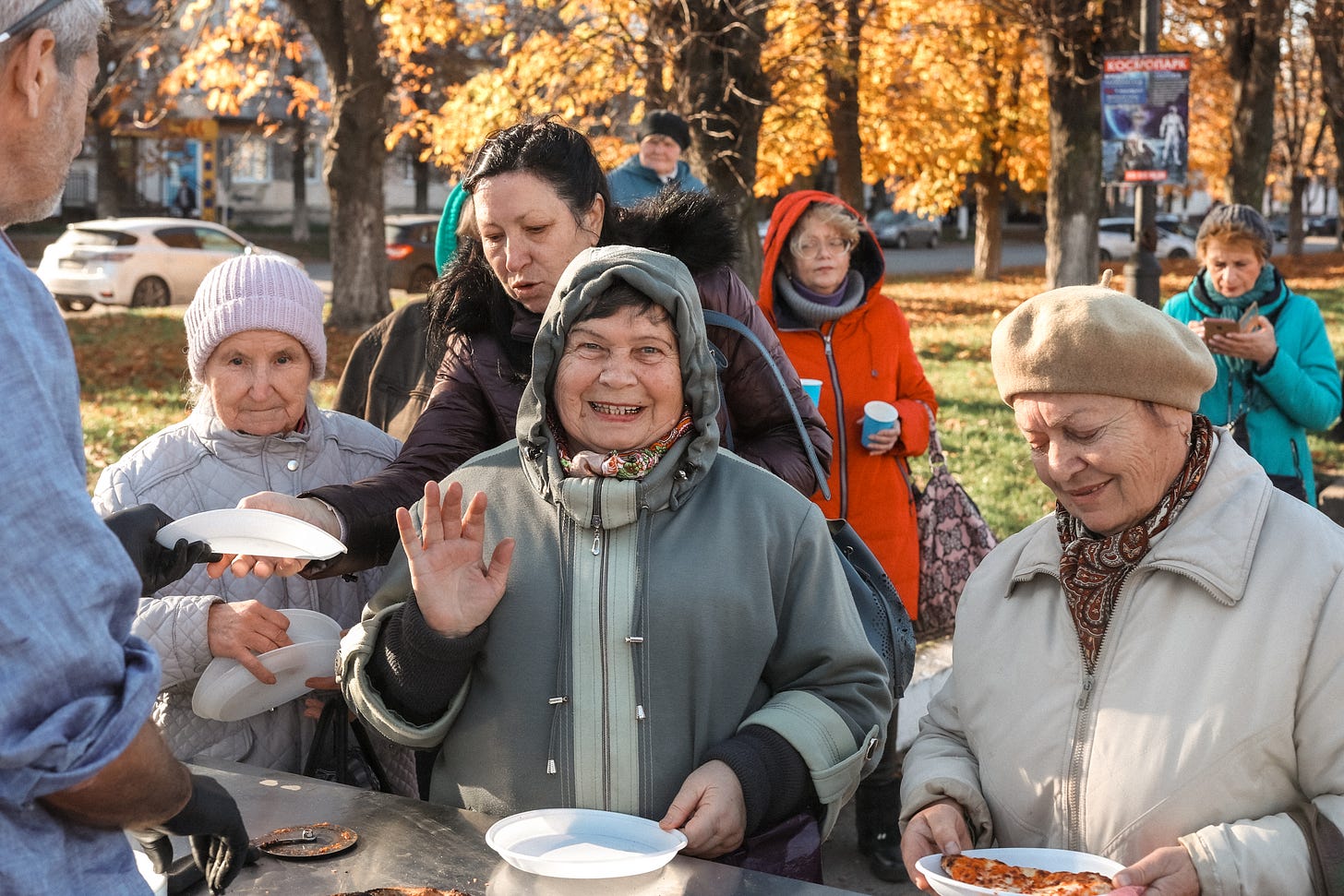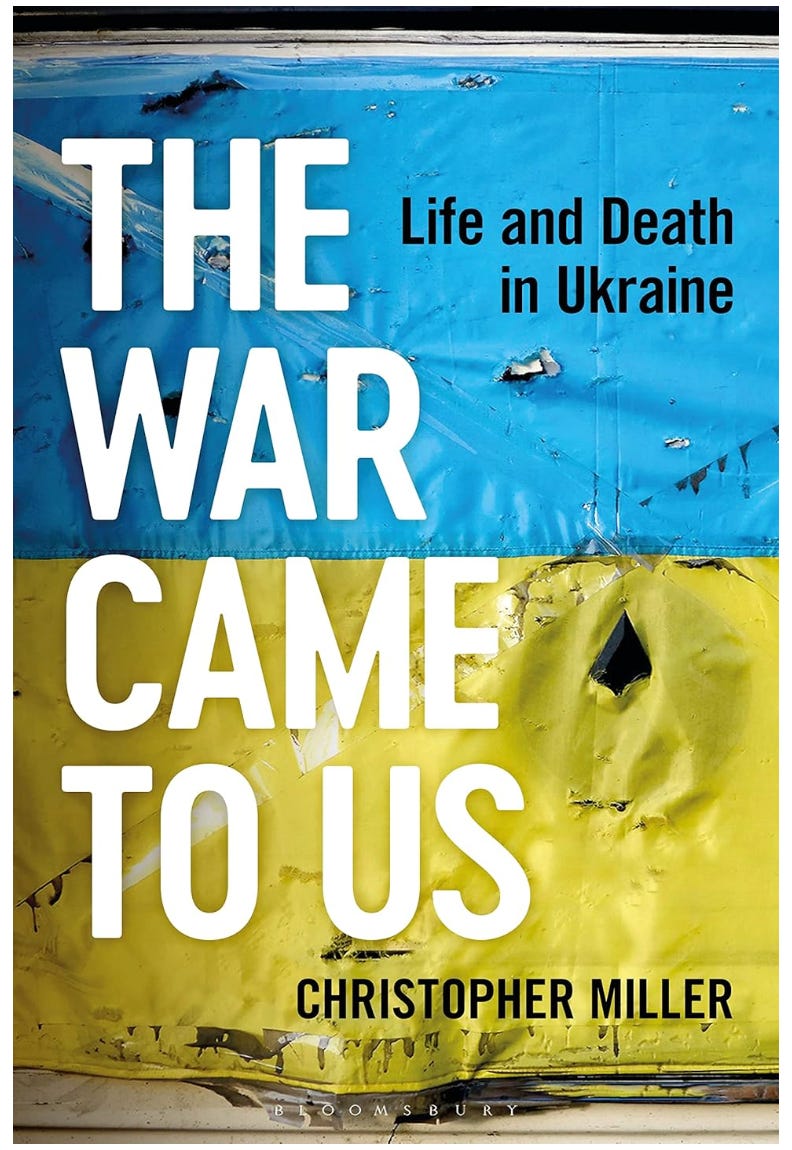Ukraine is fighting for our freedom as well as their own - we cannot desert them
Babushkas enjoying a slice of hope
Tuesday 19 November marked 1,000 days of war for Ukraine and its people. One thousand days of terror. Drone and missile attacks almost every night. Millions displaced internally or fled abroad as refugees. Tens of thousands of troops killed, thousands of civilians. Twenty thousand children stolen and ‘adopted’ in Russia.
Yet wander round the historic city of Lviv near the Polish border, or even the capital Kyiv during the day, and you could almost believe you were in any other peaceful European country, only with better coffee. As I sat in Krakow airport two weeks ago, our guide Olga explained that coffee is very important in Ukraine. “We had some of the first coffee shops in Europe,” she said. “And today, the coffee is very good. We know how to roast it.”
She is not wrong. Everywhere in Ukraine there are coffee shops. Not the corporate chains that we are so used to, but independent cafes offering first class coffee and delicious home-made cakes. Even Borodyanka, a town north of Kyiv devastated by Russian bombs in the early days of the war, boasts a wonderful café with mouthwatering macaroons. Metres away in the town hall, women weave camouflage nets for the frontline.
Scottish-based charity Hopefull delivers thousands of pizzas every week across Ukraine. Read more about their work here: www.hopefull.org.uk
I was in Ukraine as a guest of a small Scottish-based charity, HopeFull. Established by Perthshire man David Fox-Pitt, its team of volunteers deliver thousands of pizzas every week across Ukraine, from camps for internally displaced people in the west to communities as close to the frontline as they can go. “Thirty kilometres is our limit,” explains Joe Mycielski, head of fundraising.
When I was first approached, my immediate reaction was, “Pizza, seriously? In a war zone?” But within ten minutes of one of HopeFull’s small fleet of pizza trucks firing up its oven, I understood exactly the power of pizza. As stony-faced babushkas in assorted headwear jostled with laughing youngsters for a place in the queue – the older women always won – I realised that the pies, delicious as they are, are a symbol of something much more potent. HopeFull brings a message of solidarity to every person they serve with a Margherita pizza.
Xenia (70) wept as we hugged. With the help of a volunteer, she explained she and her 40-year-old daughter had fled their home in the Luhansk Oblast, the easternmost province of Ukraine. It was captured by the Russians in October 2022, and for nearly two years Xenia survived without any water, power and very little food, until escaping west. A hot pizza served on its cardboard box was more than Sunday lunch. It was a sign that Ukraine was not forgotten. Not yet.
Later that week, as I sheltered for a second night in the basement of the Ibis hotel in central Kyiv, I tried to make sense of what was happening here in Europe’s second largest country. As I struggled to my feet, numb after hours trying to sleep on a plastic chair while Putin’s drones buzzed the city’s night sky, I realised that if the brave people of Ukraine are forced to surrender to Putin in some deal cooked up by Donald Trump, then nowhere in Europe or the rest of the world is safe. “We have learned nothing from the 1930s,” said Joe mournfully as we trudged towards the lift. Upstairs, the young hotel staff had braved the eight-hour air raid to prepare a wonderful breakfast buffet of eggs, meat and a selection of Ukraine’s traditional pickled vegetables. And yes, delicious coffee. Even in a budget hotel, the coffee is first class.
As we prepared to leave Kyiv to catch the 10-hour train to Poland, I had to leave behind a jar of pickles that a woman had thrust into my hands during a visit to Bobrytsya. It wouldn’t get through the airport security check, Joe said. I cried as I set it back down on my bedside table. This glass jar with its blue plastic lid, packed full of bright red peppers in brine, represented the same hope – and yes, love – as the blistering hot pizzas HopeFull serve up every day. The woman who gave it to me had said nothing, just smiled, then ran off. She wanted nothing in return, but she and her fellow Ukrainians deserve so much more from us than pizzas, important though they are.
Sitting at my kitchen table a few days later, I spoke by phone to Sir Iain Duncan Smith MP, one of HopeFull’s patrons along with former Scotsman editor, Magnus Linklater. We laughed as we shared memories of the babushkas’ grim determination to get to the head of the pizza queue, then he said: “Ukraine isn't just about Russia. What we're witnessing is what I call the
new axis of authoritarian states, and that's now China, North Korea, Russia, Iran, Syria and a growing number of states in the Gulf backing that up.
“If Ukraine goes down and Russia succeeds, then Taiwan will be next on the list, because China is watching to see what happens…to mark the resolve of the West, which is not great at the best of times.”
And he warned that if Ukraine doesn’t succeed, if it loses out to Russia in a “ghastly deal”, Russia will be back. And in an eerie echo of the conversation I had just had in a Kyiv bomb shelter, he said, “If the 1930s teach you anything at all, it's the rapacious nature of totalitarian leaders”.
I am not a war reporter. Nor an expert in geo-politics. I am a babushka with a column. But I do know that the brave Ukrainian people, from President Zelenksy and his government, to women sewing essential military equipment and young men dying on the killing fields of the eastern front, are fighting not just for their own freedom, but for ours too. We cannot desert them.
More reading
The War Came to Us: Life and Death in Ukraine by Christopher Miller explores Ukraine’s past, present and future and explains the roots of the war in a breathtaking personal account. You can buy it here





